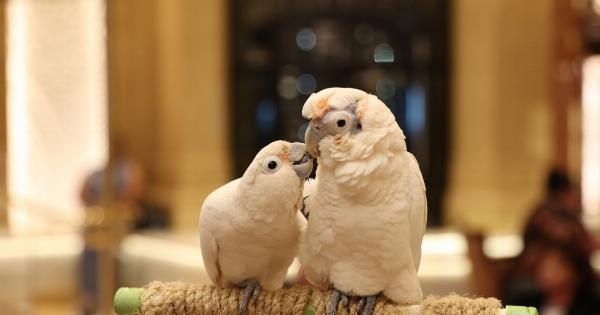One of the primary reasons why having a bird in a cage can be crushing is because it restricts their freedom.
Birds are naturally meant to soar through the skies, explore their surroundings, and engage in various activities that promote physical and mental stimulation. When confined to a cage, they are unable to express their natural instincts and may feel trapped, frustrated, and stressed.
Reason 2: Limited Social Interaction
Birds are highly social creatures that thrive on interaction with their flock or human companions. When kept in a cage, they may experience a lack of socialization, which can lead to feelings of loneliness and boredom.
Birds require companionship, mental stimulation, and social interaction to maintain their overall well-being. Without these essential elements, they may become emotionally distressed and prone to behavioral issues.
Reason 3: Inadequate Physical Exercise
In the wild, birds spend a significant amount of time flying, foraging for food, and engaging in physical activities. When confined to a cage, the space available for movement is often limited, restricting their ability to exercise.
Lack of physical exercise can result in muscle atrophy, obesity, and other health problems. Birds need regular exercise to maintain their physical health and prevent the onset of various ailments.
Reason 4: Boredom and Mental Stagnation
Birds have curious and intelligent minds that require constant stimulation. In the wild, they are exposed to a variety of sights, sounds, and challenges that keep their minds active and engaged.
However, when confined to a cage, they may experience a lack of environmental enrichment, leading to boredom and mental stagnation. This can result in behavioral problems such as excessive screaming, feather picking, and aggression.
Reason 5: Reduced Lifespan and Health Issues
Living in a cage can have detrimental effects on a bird’s overall health and lifespan.
The stress caused by confinement, inadequate exercise, and lack of mental stimulation can weaken their immune system, making them more prone to various diseases. Additionally, the lack of natural sunlight and fresh air can lead to vitamin deficiencies and respiratory problems. Birds need a well-balanced environment to thrive and live a long, healthy life.
How to React to These Reasons
While keeping a bird in a cage may present challenges, there are steps you can take to ensure their well-being and happiness:.
1. Provide a Spacious and Stimulating Environment
Opt for the largest cage possible that allows your bird to move around freely. Include various perches, toys, and branches to stimulate their natural instincts. Regularly rotate and introduce new toys to keep them mentally engaged.
2. Allow for Regular Out-of-Cage Time
Ensure your bird gets regular supervised time outside the cage. Create a safe bird-proofed area where they can stretch their wings, explore, and interact with you or other birds.
This can provide them with much-needed physical exercise and mental stimulation.
3. Encourage Social Interaction
Provide opportunities for your bird to interact with other birds or members of the household. Set up playdates, allow for supervised socialization, or consider getting a compatible bird companion for them to interact and bond with.
4. Offer Enrichment Activities
Provide a variety of mentally stimulating activities for your bird, such as puzzle toys, foraging opportunities, and training sessions. This can help keep their mind engaged and prevent boredom-related behavioral issues.
5. Ensure a Nutritious Diet
Feed your bird a well-balanced diet consisting of fresh fruits, vegetables, seeds, and pellets. Consult with an avian veterinarian to determine the most appropriate diet for your bird’s species and individual needs.
6. Seek Professional Guidance
If you notice any concerning behavioral changes or health issues, consult with an avian veterinarian or a certified avian behaviorist. They can provide valuable advice and guidance tailored to your bird’s specific needs.
Conclusion
While birds in cages may face various challenges, it is possible to create a fulfilling and enriching environment for them.
By recognizing their natural needs, providing ample space, social interaction, mental stimulation, and a nutritious diet, we can help mitigate the negative effects of confinement and promote their overall well-being and happiness.






























